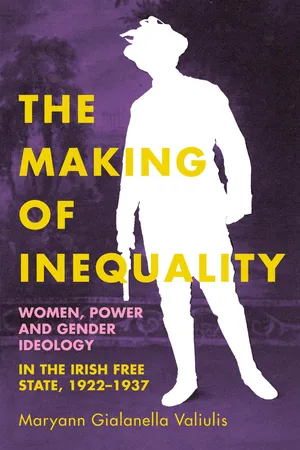
The making of inequality in the Irish Free State, 1922–37
Women, power and gender ideology
- 189 pages
- English
- PDF
- Available on iOS & Android
The making of inequality in the Irish Free State, 1922–37
Women, power and gender ideology
About this book
How did Ireland travel from the glorious Proclamation of 1916 with its promise of equality and universal citizenship to the conservative Constitution of 1937, which allowed for only a domestic identity for women? This book is a study of that journey, an overview of how specific pieces of legislation worked together to create an unequal state. Through an analysis of this legislation, which restricted women's political and economic rights, and the gender ideology it revealed, this book looks at how the promise of the revolution was thwarted and denied. In so doing, it examines the roles of women and women's organizations in this journey from equality to inequality and how women's citizenship was conceptualized. The triumph of conservatism was the result of a myriad of circumstances, the treaty that ended the Anglo-Irish War, the Civil War, and the influence of the Catholic church. Perhaps most significant was the persistence of patriarchy, which ensured the temporary success of a Catholic church-controlled, male dominated, traditional society in which women's quest for unfettered citizenship and a free and equal role in the public sphere was hindered and obstructed. From this unfinished revolution, however, emerged a vibrant twentieth-century feminist movement that contributed to an evolving, liberal democratic state.
Frequently asked questions
- Essential is ideal for learners and professionals who enjoy exploring a wide range of subjects. Access the Essential Library with 800,000+ trusted titles and best-sellers across business, personal growth, and the humanities. Includes unlimited reading time and Standard Read Aloud voice.
- Complete: Perfect for advanced learners and researchers needing full, unrestricted access. Unlock 1.4M+ books across hundreds of subjects, including academic and specialized titles. The Complete Plan also includes advanced features like Premium Read Aloud and Research Assistant.
Please note we cannot support devices running on iOS 13 and Android 7 or earlier. Learn more about using the app.
Information
Table of contents
- Cover
- Dedication
- Title page
- Copyright page
- Table of contents
- Acknowledgments
- Abbreviations
- Introduction
- 1. The promise of equality, the perseverance of patriarchy
- 2. The first test of citizenship: jury service for women, or 'No women need apply'
- 3. For men only: the right to employment
- 4. The ecclesiastical sanctioning of domesticity
- 5. Women and the issue of public identity
- Conclusion
- Bibliography
- Index